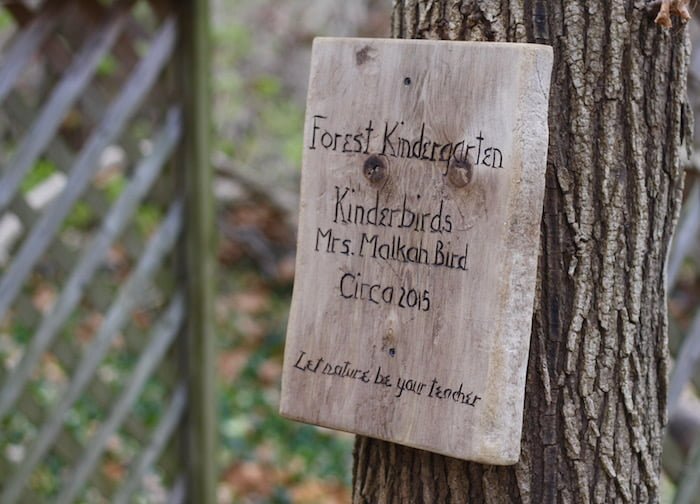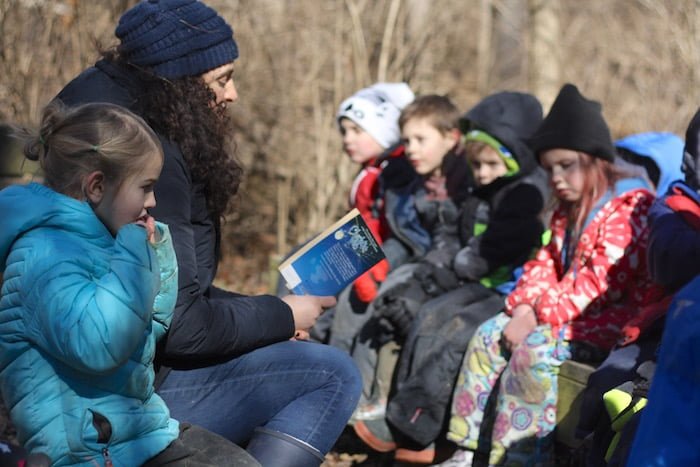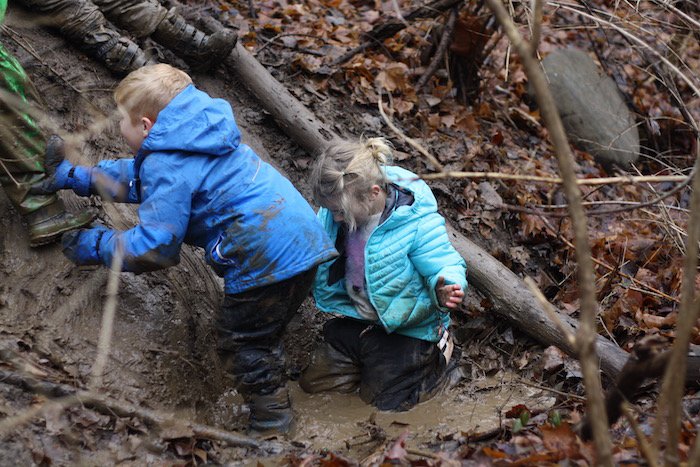Forest Kindergarten: Where Learning Goes Into the Woods
Forest kindergarten is an enchanting way to help children connect with nature. In forest schools, children spend most of the day outside, no matter the weather.
Forest kindergarten is a sacred time to explore and be present in nature. It’s where children meditate while listening to the wind weave through the trees. It’s where they share cups of herbal tea on cold days. And it’s where they get muddy, climb trees, test their courage, and share this unique learning experience with each other.
The Benefits of Forest Kindergarten
It offers the same early childhood education tenets of traditional school, and provides the added benefits of learning outdoors.
- Learning outdoors is generally more hands-on, leading to a better understanding and memory.
- Outdoor “classrooms” are the ideal settings for many subjects, especially Science.
- Unstructured outdoor play promotes problem-solving skills.
- Time away from desks, worksheets, and screens boosts creativity.
- The outdoor landscape helps develop gross motor skills.
- Physical exercise helps overall wellbeing and mental health in the short and long term.
- Fresh air is healthier to a child’s growing body than breathing the harsh cleaners in most classrooms.
- Open air living and learning is a powerful antidote to technology addiction in kids.
- Exposure to dirt builds a more sturdy microbiome, leading to a stronger immune system.
- Kids learn resilience through spending time outside in the rain or cold.
“The forest kindergarten is a great way to authentically connect children with nature,” explained Erin Kenney, founder of Cedarsong Nature School. Cedarsong Way was one of the original forest schools in the U.S. and was based on the German “waldkindergarten.”
Kenney says the child-driven educational philosophy and resulting emergent curriculum creates a relaxing and fun environment that makes learning more meaningful.
Children spend a great deal of time digging in the soil. During these explorations, they make exciting discoveries by unearthing different colors of dirt, buried charcoal, or decomposing logs.
In forest school’s inquiry-based teaching style, these observations become an opportunity for teachers to ask leading questions such as “How do you think this log got under the dirt?” There are no wrong answers, allowing even young children to make their own hypotheses about biology.
A Day in the Life of Students at Forest Kindergarten
An old Scandinavian saying is: there’s no such thing as bad weather, only bad clothing. This is the approach Malkah Bird’s kindergarten class at Meridian Hills Cooperative Nursery School & Kindergarten takes in Indianapolis, Indiana.
Every day, the 14 kindergarteners spend a good chunk of their day outdoors. Rain, snow, wind, and heat don’t stop them. They just bundle up (or pare back layers) and keep playing.
The class enters the woods adjacent to their school to learn in their outdoor classroom. Here, surrounded by trees and bird song, the children write and draw in journals, read books, and explore the woods they call their own.
We sat down with Bird to discuss the a day in the life at forest kindergarten, the importance of play-based learning, and the benefits of letting nature be your teacher.
Why did you want to bring the Forest Kindergarten Movement to your students?
Meridian Hills Co-op has always had a strong outdoor component to our school, between our wonderful, nature-rich playground and our many field trips out into our local natural environments.
After years of watching our kids thrive in theses environments, I was really interested in the possibility of taking this aspect and making it a more formal part of our curriculum. In an indoor classroom, we are always looking for inspiring materials and challenges to introduce to our students in the hopes of sparking interest and exploration.
When you are out with a group of children in the forest, you are surrounded by infinite opportunities for curiosity and exploration. From the sights, sounds and smells of the forest, to trying to understand the life cycle of insects, each week in the woods brings us new challenges and and new questions.
Along with that, I know that living in a city, with all of our busy daily lives, families often struggle to find time to drop everything and head into the woods. It feels exciting and important to create an educational space where that is prioritized, and where kids and their parents have the opportunity to learn and enjoy it together.
How do you feel your students benefit from learning outside?
The benefits are really more than I can count. Over the course of the school year, I have watched the kids become confident and passionate stewards of the natural world. They have fallen in love with nature.
Students have learned the ins and outs of our forest space and really came to an in-depth understanding of our environments, our annual weather cycles and patterns, and safety, communication, and teamwork.
They loved our space for both its familiarity and its unpredictability. And they became careful observers of the world around them as they began to take notice of and document changes both subtle and great.
I’m impressed by the depth and complexity of some of our conversations in the forest. We discussed the impacts of noise pollution. They would comment on sounds from a nearby road during our quiet meditation time.
We had a year long study on invasive species, as we watched Japanese Honeysuckle take over our space and crowd out other plants and trees. They used their nature journals to document their observations through words and pictures. We were inspired to make art in the forest, share meals together, and find ways to keep warm or cool depending on the season.
How do you allow for plenty of play time during the school day?
Open-ended, child-led play is really the foundational component to our kindergarten program. There is no question for me that young children learn best through play. Authentic play also reduces stress in kids.
Kindergarten is a place to find some of the most curious, imaginative, innovative, and passionate learners. Having the time, space, materials, and support to ask their own questions, and then set out on the journey to answer them is the most effective way to gain new skills and retain new concepts.
As the teacher, a lot of the times, it means knowing when to get out of the way. We want kids to love learning and feel like confident and capable problem-solvers. The only way to do that, we’ve found, is to really let them solve their own problems.
Every day our kindergarten class has a full hour of uninterrupted free play time. It looks different every day, depending on their interests, their friends, and the available materials. On any given day, we will find kids building with blocks, exploring a sensory table, writing letters to friends, designing and creating props for imaginary play, making art, or creating obstacle courses for each other.
The whole time, they are working on all of the foundational social skills, literacy skills, math skills, fine motor skills, and gross motor skills in ways that feel authentic and exciting.
How do students and their parents feel about forest kindergarten?
The parents have really loved seeing their kids connect with nature in these new ways. Because we are a co-op, parents have the opportunity to experience this alongside their kids.
While most of our families have been hiking or adventuring in the forest many times before, there really is something different about a large group of kids, working together to care for and learn about a wild space. At the end of the year, the word that we used most often to describe the whole experience is “magic.”
If there’s no forest kindergarten program or forest school near you, you can still incorporate many of the principles into your child’s life. Offer daily nature immersion time at home. Make it a combination of activities like an outdoor scavenger hunt and unstructured play time where there are no rules or goals.
Other types of child led education encourage outdoor time and nature. Look into Waldorf education or find an accredited Montessori program. If you’re a homeschooling family, Oak Meadow offers nature based curriculum for preschool through elementary school and beyond.



